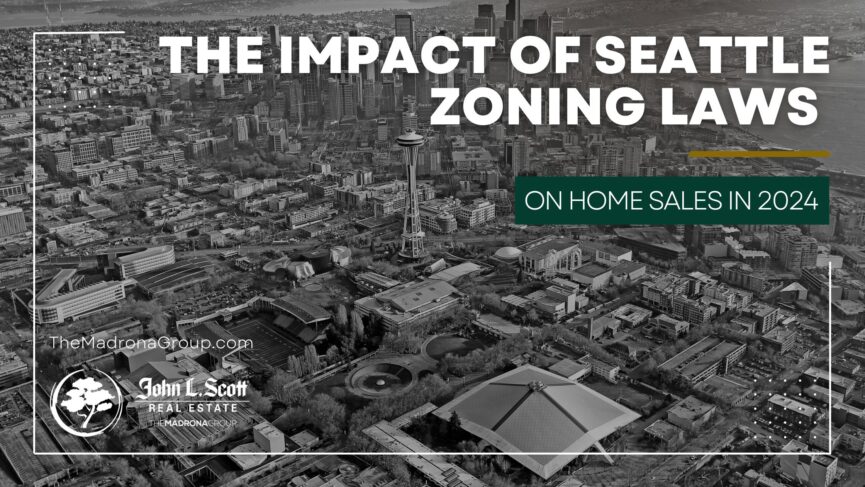“Seattle’s zoning laws are a vital factor in determining housing availability and prices. In fact, a study by the National Bureau of Economic Research found that restrictive zoning in urban areas like Seattle can increase home prices by as much as 30%.”
Seattle’s real estate market is always evolving, and one of the driving forces behind home sales in 2024 is zoning laws. Whether you’re considering selling your home or just keeping an eye on market trends, it’s important to understand the impact of Seattle zoning laws on the market and, ultimately, the value of your home.
Zoning may not sound like the most exciting topic, but if you’re a homeowner in Seattle, these regulations can have a direct impact on your home’s value and how quickly it sells. Zoning controls everything from the types of homes that can be built to how land is used in different neighborhoods. And in 2024, several major changes—especially with the passing of House Bill 1110 (HB 1110) and House Bill 1337 (HB 1337)—are set to reshape the Seattle real estate market in a big way.
In this post, we’ll break down how Seattle’s zoning laws impact home sales, what’s changing in 2024, and how The Madrona Group can help you navigate these new regulations when selling your home.
What to Expect:
- A breakdown of what zoning laws are and how they work in Seattle.
- Insight into the changes in Seattle zoning laws in 2024, including HB 1110 and HB 1337, and what they mean for home sellers.
- How zoning impacts home prices, market demand, and the time it takes to sell a home.
- The role of The Madrona Group in helping sellers understand zoning when listing a home.
What Are Zoning Laws, and How Do They Affect Home Sales?
At its core, zoning is about city planning. Seattle’s zoning laws regulate how land can be used in different parts of the city, determining whether an area is designated for residential, commercial, or industrial use. They also dictate the types of homes that can be built—whether single-family homes, duplexes, or apartment complexes are allowed.
Why does this matter when selling your home?
Zoning laws can impact everything from the size of your buyer pool to your home’s potential value. Here are a few ways zoning plays a role in home sales:
- Home Size and Layout: Zoning laws determine the size and type of homes that can be built in your area. If your neighborhood is limited to single-family homes, this may restrict the number of potential buyers compared to areas that allow for duplexes or townhomes.
- Development Potential: Some buyers, especially developers or investors, are on the lookout for properties with development potential. If your home is in a neighborhood zoned for higher density, such as allowing multi-family units, your property could attract more interest and potentially fetch a higher price.
- Neighborhood Character: Zoning laws shape the character of neighborhoods. Buyers seeking a quieter, more suburban atmosphere are often drawn to areas zoned for single-family homes, while those looking for vibrant, urban communities may prefer mixed-use or denser zones.
Seattle Zoning Laws in 2024: What’s New?
Seattle’s zoning laws are evolving rapidly, and 2024 brings some of the most significant changes yet. These changes, driven by new legislation like HB 1110 and HB 1337, aim to address the city’s housing shortage, create more affordable housing options, and promote sustainable development.
1. HB 1110: Upzoning for Missing Middle Housing
House Bill 1110 is a landmark piece of legislation designed to increase housing density by allowing for more “missing middle” housing. Missing middle housing refers to duplexes, triplexes, and fourplexes—smaller multi-unit housing options that bridge the gap between single-family homes and larger apartment buildings.
Historically, large portions of Seattle have been zoned exclusively for single-family homes, which limits housing diversity and density. HB 1110 changes this by allowing duplexes, triplexes, and fourplexes in neighborhoods previously restricted to single-family homes, particularly in areas near public transit and urban centers.
What this means for sellers:
- Increased Development Interest: If your home is in an area that has been upzoned, it may attract developers or investors interested in building multi-unit properties. These buyers are often willing to pay a premium for properties with greater development potential.
- Greater Buyer Flexibility: Traditional buyers may also view your property as more valuable if they have the option to build additional units, creating rental income or multi-generational living arrangements.
- Increased Competition: As more properties in upzoned areas hit the market, competition among sellers may rise. However, homes with development potential will likely stand out to savvy buyers.
2. HB 1337: Expanded Accessory Dwelling Units (ADUs)
House Bill 1337 builds on the flexibility introduced by HB 1110 by making it easier for homeowners to add Accessory Dwelling Units (ADUs) to their properties. ADUs can be internal (like a basement apartment) or detached (such as a backyard cottage). This law eliminates many of the restrictions that made ADU development difficult, including parking requirements and minimum lot sizes.
Homeowners can now build both internal ADUs (IADUs) and detached ADUs (DADUs) on the same property, significantly expanding the potential for additional living space or rental income.
What this means for sellers:
- Boosted Property Value: Homes with existing ADUs or the potential to add them are more attractive to buyers who may want to generate rental income or house family members. This could increase your home’s value and lead to higher offers.
- Appeal to Multi-Generational Buyers: Buyers looking for flexible living arrangements—such as space for aging parents or adult children—will likely view properties with ADUs as more desirable.
- Increased Market Competition: As ADU potential becomes a bigger selling point, homes in neighborhoods that were once exclusively single-family may now see increased interest from both developers and individual buyers.
3. Transit-Oriented Development (TOD) Expansion
Seattle is investing heavily in expanding public transit infrastructure, including new light rail and bus rapid transit lines. In 2024, zoning changes around transit hubs are aimed at encouraging Transit-Oriented Development (TOD)—higher-density, mixed-use development near public transportation.
These TOD zones allow for taller buildings and more units, making them prime areas for new residential and commercial development.
What this means for sellers:
- Higher Property Value Near Transit: Homes located near these expanded transit hubs are likely to see increased demand, especially from buyers who prioritize walkability and easy access to public transportation.
- Attractive to Developers: Developers looking to capitalize on the increased density allowances in TOD zones may be willing to pay more for properties in these areas, particularly if they can build multi-unit housing or mixed-use buildings.
4. Single-Family Zones Loosening Restrictions
In recent years, Seattle’s reliance on single-family zoning has been a point of contention, with many arguing that it exacerbates the housing shortage. In 2024, zoning policies are loosening restrictions in traditionally single-family neighborhoods, making it easier for homeowners to add ADUs or convert their properties into multi-unit housing.
What this means for sellers:
- More Development Opportunities: If you own a single-family home in a neighborhood where restrictions are loosening, your property may become more attractive to buyers looking to create rental units or multi-family housing.
- Increased Home Value: The ability to build ADUs or additional units on a single-family lot can significantly boost your home’s value and marketability.
5. Affordable Housing Incentives
Seattle’s Mandatory Housing Affordability (MHA) program, which requires developers to either include affordable housing units or contribute to an affordable housing fund, is expanding in 2024. These requirements now apply to more neighborhoods, particularly those affected by upzoning and TOD expansion.
What this means for sellers:
- Improved Neighborhood Appeal: As more affordable housing options become available, neighborhoods may attract a wider range of buyers, improving community diversity and appeal.
- Higher Demand in MHA Zones: Developers looking to meet affordable housing requirements may seek properties in these newly upzoned or TOD areas, potentially driving up demand and home values.
How Zoning Impacts Home Prices and Sales Timelines
When it comes to selling your home in Seattle, zoning laws can have a major impact on both your sale price and how quickly your home sells. Here’s how:
- Increased Demand in Upzoned Areas: If your home is located in an upzoned area, it may attract developers and investors looking to build multi-unit properties, which can lead to higher offers and quicker sales.
- Flexibility for Buyers: Zoning changes that allow for ADUs or multi-family units make homes more attractive to a wider range of buyers, from investors to families looking for multi-generational living arrangements.
- Proximity to Transit Increases Value: Homes near transit hubs, especially those in TOD zones, tend to sell more quickly and for higher prices due to the convenience and demand for transit-oriented living.
Conclusion to Impact of Zoning Laws on Home Sales
Zoning laws might not be the first thing that comes to mind when you’re thinking about selling your home, but in Seattle, they play a huge role in determining how much your home is worth and how quickly it will sell. The changes introduced in 2024, including HB 1110 and HB 1337, are poised to reshape neighborhoods by allowing for more density, flexibility, and development opportunities. Whether it’s upzoning to permit duplexes and triplexes, loosening restrictions on ADUs, or expanding transit-oriented development zones, these zoning laws are creating new possibilities for Seattle homeowners.
If your home is in an upzoned area or has the potential for ADUs, it could see a substantial increase in demand and value. Buyers are increasingly looking for flexibility and investment potential, and properties that align with the new zoning regulations are likely to stand out in the market.
The Madrona Group: Helping You Navigate Seattle Zoning Laws
Zoning laws are complex, but you don’t have to navigate them alone. At The Madrona Group, we specialize in understanding Seattle’s ever-changing real estate market, including how zoning laws impact home sales.
Share this post!





2 Comments on “The Impact of Seattle Zoning Laws on Home Sales in 2024”
Mr. Fox, we live in an upzoning area and the neighbourhood is fighting with the developer/City who wants to build 6 levels vs 4 levels which is identical with other buildings on the same street.
It is a short block and doesn’t have the capacity for excessive added traffic, parking, pedestrian if they build 6 levels with 350 new rental units.
I would think there are guidelines and laws to help the people who live in the neighbourhood and will be directly impacted by the new development.
Thank you, Kathleen
As these are all new it impossible to say how it will end up. From what I am to understand each city is responsible for how they enforce these new laws.